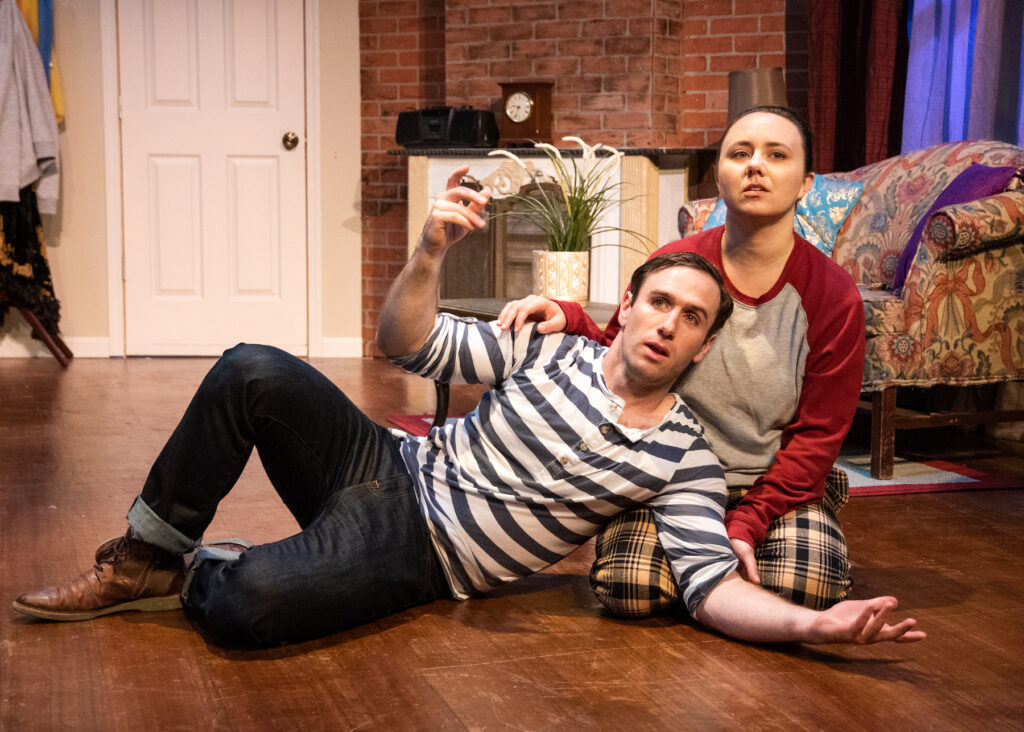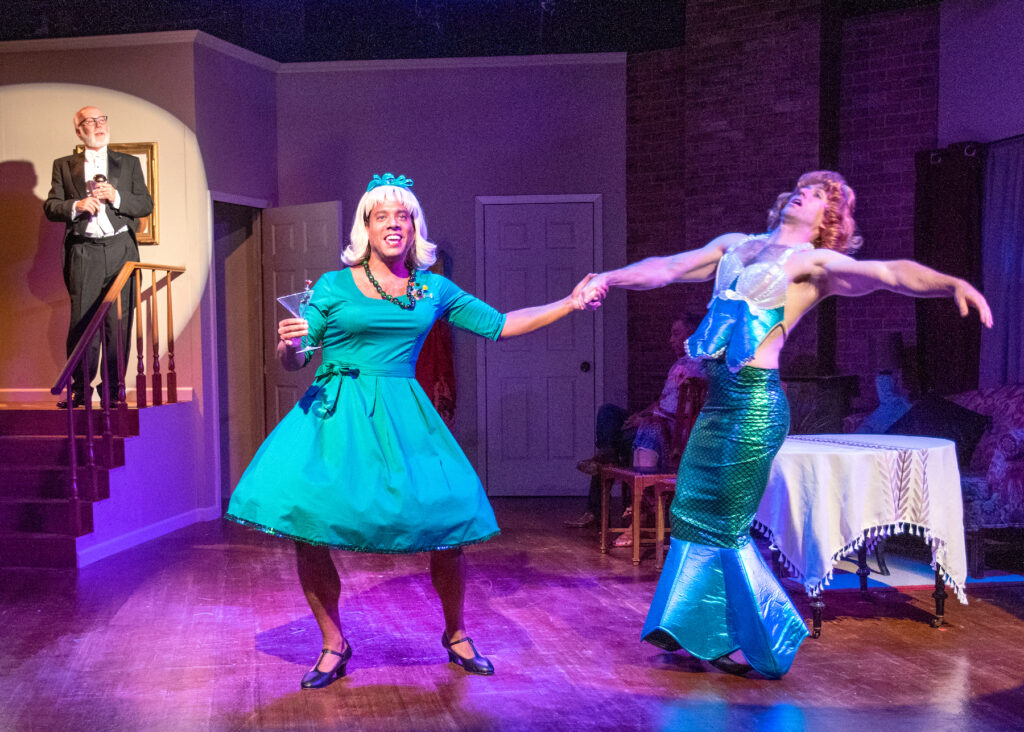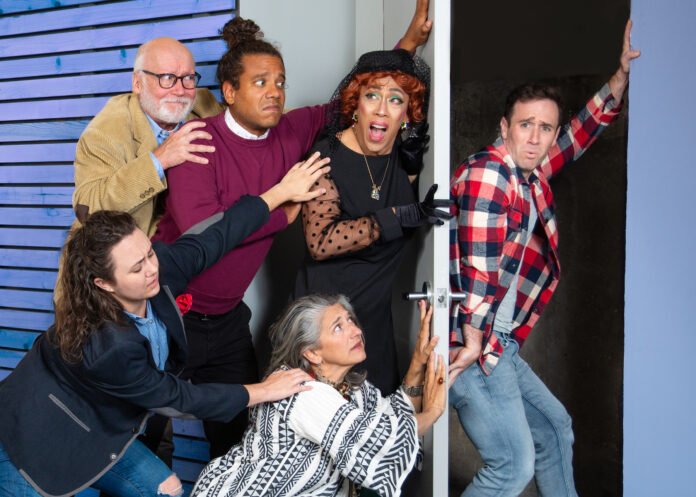It wasn’t until I arrived at New Conservatory Theatre Center that I became aware of the company’s modified COVID protocols since their last season. Despite their thoroughness the last year-and-a-half, they’ve now dropped their vaccine requirement. Masks are still required when not actively drinking in the lobby, but the extra layer of safety that comes from a vax check is now gone. Fortunately, they still practice reduced seating and keep their HVAC running—noticeable by the cool breeze throughout the show—but one may feel anxiety every time they see an unmasked face. (My Aranet4’s readings floated around 1220ppm all night, peaking at about 1253ppm.)
Having said that, I can at least say that the show I was there to see was worth going out for. I imagine that playwright Nora Brigid Monahan has seen enough Hollywood romcoms and gay-joke slapstick to last a lifetime. It would explain why they more or less deconstruct those genres with Aunt Jack (through October 16). In fact, the play seems alike like a response to La Cage aux Folles, remade in the US as The Birdcage.
We begin with the introduction of our young, white breeder, Norman (Nick Trengove). He’s the sort of dodgy stand-up you’d find at any open-mic night. He mentions that not only is he gay, it would be weird for him to be otherwise. After all, both his biological father, scholar George (Jim Rupp), and “other dad,” drag performer Jack (Joseph Alvarado), were always open with their homosexuality.
Plus, his biological mother Phyllis (Jennifer McGeorge) is a lesbian. Hell, other than the way all of Norman’s parents continue to fawn over his ex, Ian (Ryan Marchand), why would Norman be afraid to bring home his new beau?
Probably because she’s a cis woman, Andy (Emily Steelhammer). It’s not enough that the family’s gathered together due to a sudden tragedy, but Norman suddenly has to explain why he’s come home with some who is, let’s say, different from whom he’s dated before.
As someone who intentionally goes into shows knowing as little as possible, I began to suspect Andy was a woman when Norman met with George and began—to quote Chasing Amy—“playing the pronoun game.” By the time she finally appears and receives the third degree from Jack and Phyllis, it was clear that Monahan was commenting on a well-worn genre. Even if sexual orientation weren’t the focus, the “mistaken identity of the unseen spouse” troupe appeared plenty of times in interracial romcoms, like the classic Guess Who’s Coming to Dinner? and the god-awful Guess Who?.
Monahan’s strength is two-fold: first, they know their audience is so familiar with the tropes that subverting those tropes will all the more fun; and secondly, they choose to make commentary because they actually have something to say. In this case, it’s about the generation gap between LGBTQ+ boomers and millennials. In fact, it’s one of the better new plays I’ve seen cover that topic since SF Playhouse developed Patricia Cotter’s The Daughters.

The play begins with the openly gay George giving a lecture in which he takes a stance against marriage equality because he sees it as conformity, something he, Jack, and Phyllis have spent their whole lives rejecting. But time marches on, and the “ill repute” of gay Mecca Christopher Street (the play takes place in New York, though Norman and Andy live in SF) has made way for Lil Nas X to become a platinum-selling sensation. The boomers are so used to fighting that they can’t wrap their heads around someone like Andy, with her sensitivity to pronouns, knowledge of sexuality-as-a-spectrum, and such a goddamn nice demeanor it makes you want to tear your hair out.
Monahan could have taken the easy way out and just made some over-the-top camp-fest with drag queens and angry dykes, but the presentation of these characters as genre archetypes is done so as give the archetypes dimension. Monahan is less concerned about the outlandishness of the situations so much as the people living through them.
Take the character of Ian (played equally sassy and heartbreaking by Marchand): I’m genuinely curious as to whether director Jeffrey Hoffman cast a Black actor in the role so as to subvert the “gay Black bestie” trope, because Ian turns out to be the heart of the entire story. Given one of the play’s most crucial moments, he knows he’s been manipulated and has to tell people to their faces, “You’re not Lucy and Ethel; your ‘hijinks’ are real and they have consequences!”

Monahan’s laugh-out-loud play isn’t about playing “right vs. wrong,” it’s a group of people so set in their ways that the possibility of a viable alternative never even occurs to them.
Both they and Hoffman are given a fine cast with which to do it, though Hoffman occasionally stages too many scenes of characters simply standing passively. Having worked with both Trengove and Marchand before, I went in knowing that they could hit the right notes when called upon. Rupp never seems to quite get a solid hold on George, often coming off like a Frank Constanza impression.
McGeorge and Alvarado bring the right amount of sass to Phyllis and Jack, respectively, the latter not being the strongest singer, but clearly understanding the showmanship that goes into performing drag. Yet, the show is all but stolen by Steelhammer, whose dry wit makes Andy constantly in danger of being a know-it-all, but stays on the just the right side of “I don’t have to prove I’m right for it to be true.”
Add in a detailed set by Kate Boyd and story-relevant wig design by Jessica Carter, and Aunt Jack feels not just like genre commentary, but a necessary entry the genre’s been missing.
With NCTC’s new COVID rules, I can’t say for sure when I’ll be back to see another show. The pandemic isn’t over and everyone should exercise caution at all times. Still, this one was an entertaining show to see with a (hopefully) safe audience. I hope future audiences exercise common sense, because the talented folks behind this show deserve to know that their hilarious efforts don’t put anyone at risk.
AUNT JACK’s West Coast premiere runs through October 16 at the New Conservatory Theatre Center, SF. Tickets and info here.








